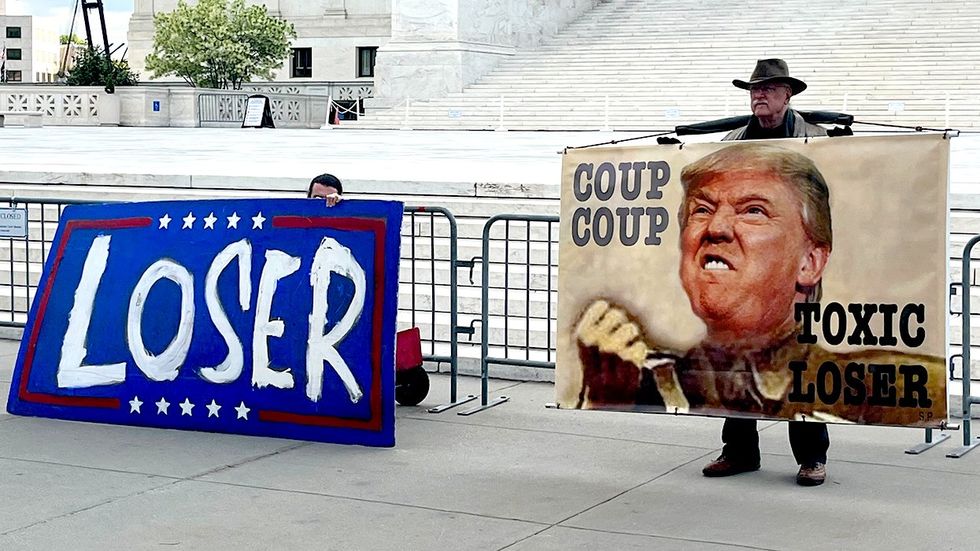In a momentous U.S. Supreme Court session on Thursday, justices expressed skepticism about the expansive immunity claims presented by former President Donald Trump’s legal team. The high-profile case, which questions whether Trump can be prosecuted for actions related to his attempt to overturn the 2020 election results, seized national attention, packed the courtroom to capacity, and drew a large assembly of media and protesters outside.
Trump’s attorney, D. John Sauer, vehemently argued for a broad interpretation of presidential immunity. Sauer asserted that the former president’s actions, which included efforts to influence the results through various means including sending fake slates of electors, were performed in his official capacity and therefore should be shielded from prosecution. Sauer’s position suggested that such immunity would extend even to extreme measures, implying that actions taken under the guise of official duties, regardless of their legality or impact on democratic norms, would not be prosecutable.
This stance prompted pointed questions from the justices. Justice Elena Kagan, for instance, probed whether Trump’s efforts to deploy so-called fake electors could realistically be considered within the bounds of presidential duties.
Kagan posed a direct question to Sauer, asking, “How about if a president orders the military to stage a coup?” Sauer’s response indicated a broad view of immunity, saying, “If it’s an official act, there needs to be impeachment and conviction beforehand” through Congress. When pressed by Kagan on whether such a coup would be considered an “official act,” Sauer admitted, “On the way you described that hypothetical, it could well be.” Kagan responded with a pointed remark, “That sure sounds bad, doesn’t it?” which elicited laughter from those in the courtroom.
Justices from both sides of the ideological divide challenged the breadth of immunity being asserted, probing whether Trump’s actions during the contentious election period fell within the scope of his official duties.
Justice Amy Coney Barrett, appointed by Trump, sought clarity on the distinctions between supposedly official acts and private undertakings, highlighting specific interactions involving private actors like Rudy Giuliani, who spread false election fraud claims.
 Christopher Wiggins for The Advocate
Christopher Wiggins for The Advocate
In response to Trump’s team, the government’s attorney, Michael Dreeben, argued that the current legal framework adequately addresses the balance between presidential responsibilities and legal accountability and does not support Trump’s legal team’s “radical proposal” for sweeping immunity. Dreeben emphasized that no president should be above the law, particularly when their actions undermine democratic processes.
Justice Kagan raised concerns about the broader implications of such sweeping immunity, questioning whether it would place a president above the law and undermine the core principles of American democracy. Kagan focused on the long-term implications of the court’s decision, discussing how it would influence the balance of power and the accountability mechanisms in place for the highest office. She stressed the risk of a ruling that might inadvertently grant excessive power to the presidency, undermining the democratic process. Justice Ketanji Brown Jackson echoed these concerns, emphasizing the dangerous precedent that extensive immunity could set, potentially turning the presidency into a haven for unchecked criminal activity.
"If someone with those kinds of powers—the most powerful person in the world, with the greatest amount of authority—could go into office knowing that there would be no potential penalty for committing crimes. I'm trying to understand what the disincentive is from turning the Oval Office into, you know, the seat of criminal activity in this country," Jackson said.
Justice Sonia Sotomayor sharply questioned Sauer, delving into the contentious issue of presidential immunity in extreme cases, such as the potential assassination of political rivals. Sotomayor posed a hypothetical, pressing Sauer for clarity: “If the president decides that his rival is a corrupt person, and he orders the military or orders someone to assassinate him, is that within his official acts for which he can get immunity?” Sauer’s response suggested a broad interpretation of presidential powers, “It would depend on the hypothetical but we can see that would well be an official act.” Sotomayor countered, emphasizing the personal motive behind such an act, “It could, and why? Because he’s doing it for personal reasons. He’s not doing it like President Obama is alleged to have done it, to protect the country from a terrorist. He’s doing it for personal gain. And isn’t that the nature of the allegations here? That he’s not doing these acts in furtherance of an official responsibility, he’s doing it for personal gain.”
Sauer attempted to defend his position, suggesting that such characterization still falls under immunity, “I agree with that characterization of the indictment, and that confirms immunity, because the characterization is there is a series of acts that were done for—”, but he was quickly interrupted by Sotomayor who challenged the logic of granting immunity for actions taken for personal gain, “No, because immunity says, even if you did it for personal gain, we won’t hold you responsible. How could that be?”
Meanwhile, Justice Neil Gorsuch considered the historical and legal precedents related to the issue, emphasizing the need for a decision grounded on a solid constitutional foundation rather than broad, undefined principles that could lead to unpredictable results.
Outside the courthouse, barriers contained the crowds of demonstrators and media personnel. Protesters voiced their opinions on presidential accountability while the media buzzed with live updates.
The ruling in the case, expected before the end of the Supreme Court’s term in late June, could redefine the boundaries of presidential power and establish a lasting precedent for the legal landscape regarding presidential conduct.
The implications of this decision are profound, impacting not only Trump’s legal battles but also the broader accountability standards for others holding high office in the U.S. government. With the courtroom’s intensity mirrored by the passionate public display outside, this case underscores the deep divisions and high stakes involved in defining the contours of presidential immunity.

































 Christopher Wiggins for The Advocate
Christopher Wiggins for The Advocate


















































